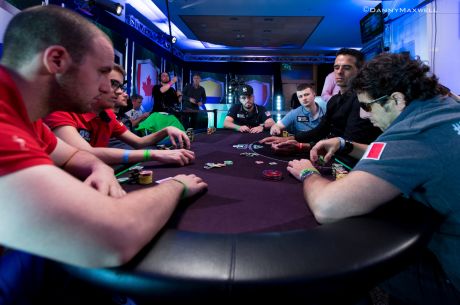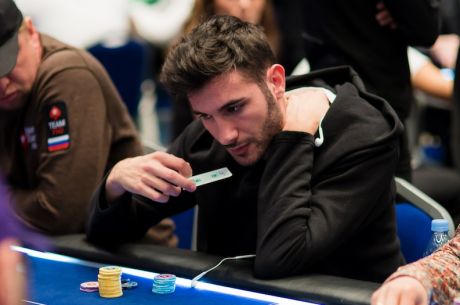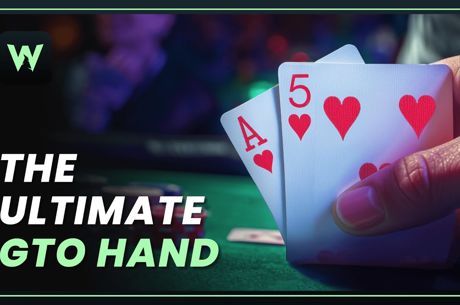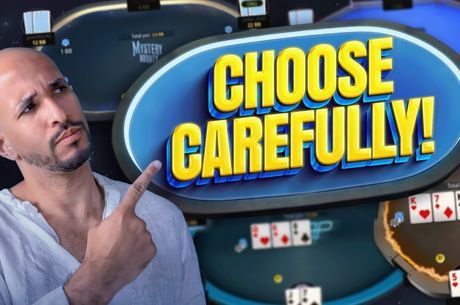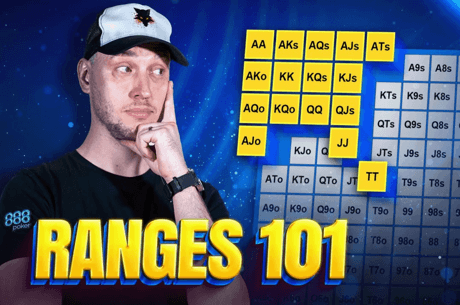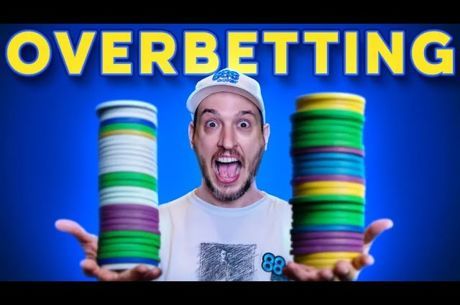To Bet or Not to Bet: That Is the Question

I would like to take as my text today a bit of wisdom from TJ Cloutier, whose book on tournament no-limit hold’em was the first poker strategy book I ever read. It came, though, not from that book, but from what I believe was his only appearance on the NBC television show, Poker After Dark. This was from Season 2, a show first broadcast in September 2007.
It requires a bit of set-up:
In the last hand of the previous episode, the one-table tournament was down to four players. The blinds were 200/400, and Cloutier and Doyle Brunson both folded. Phil Hellmuth then raised to 1,000 from the small blind with Q♠3♦. Erik Seidel called the raise from the big blind holding K♦Q♦.
The flop was Q♥A♠3♠. Hellmuth bet 900. Seidel raised to 2,500. Hellmuth called. Both players then checked the 4♦ turn.
The A♦ river counterfeited Hellmuth’s flopped two pair (queens and treys), giving Seidel a better two pair — aces and queens with a king kicker. Hellmuth checked. Seidel bet 4,000, and Hellmuth called.
This set up a typical Hellmuthian rant about how perfectly he had played and how lucky Seidel had been to beat him. Among his complaints was this, to Seidel:
“You’re not even in the same league, Erik. Just be happy the deck saves you every pot we play. I keep slow playing it, and you’ve sucked out on me like five in a row that I’ve slow played, all just weird beats. And I could have won all five pots, but I want to let you...”
At this point, Cloutier interrupts: “I want to make a comment on that. I would think the solution to that would be not to slow play it.”
It was one of the few genuine laugh-out-loud moments I remember from that show. And, of course, it also contained a pearl of wisdom — one which was, I’m afraid, lost when it was cast before the swine that was too busy squealing.
On those rare occasions when you flop a big hand — let’s say two pair or better — what should you do? As with all poker strategy questions, the real answer is “It depends.” But we can do a little better than that.
First let me make clear that my context for discussing this problem is a no-limit game, either cash or a deep-stacked tournament, so that you have a lot of room to maneuver. I’m also assuming opponents who are not high-level thinkers and players, but typical, casual amateurs.
Let’s lay out the factors to consider. There are a lot of them.
Position
As a general rule, slow playing makes more sense when out of position than when in position, because if your opponent will reliably bet, you might get money out of him in spots where a lead-out bet will cause him to fold.
On the other hand, though, you can flip that logic on its head. Most amateur players will only donk bet with a fairly narrow range of hands — most commonly when they flop top pair. They will tend to go for a check-raise or other form of slow play with their biggest hands and their bluffs. If we assume that our opponent knows this, then we cause him to misread our hand range by open-betting strong hands.
For example, if I have A♣10♦ on a flop of A♠10♥5♣, I very much want my opponent holding A♥K♠ to read my lead-out bet as a medium-strength hand such as Ax9x, and therefore either call or raise.
Who has the lead?
It is much more natural to open the betting if you took the last aggressive action preflop. That factor, therefore, adds weight to betting rather than playing passively.
Table image
If you have been fairly consistently making continuation bets after being aggressive preflop, then it’s usually best to continue doing so when you flop big. You want opponents to think that you’re just following your standard playbook. A sudden change to passive play might set off their alarms, which is the last thing you want.
Opponents’ tendencies
If you are facing Dr. Aggresso, who will leap at any sign of weakness, then slow playing makes more sense. It’s the old “give him rope and let him hang himself” thing. Conversely, if you’re at a table full of passive players, put the money in and hope they’ll follow along with their much weaker holdings.
Pot size
It is a general truth that the bigger the pot, the greater your motivation to win it right away, rather than delay decisive action while it builds further. So if there was a lot of preflop action and there’s a lot of money already in the middle of the table, you should be less inclined to go for the slow play.
Number of opponents
I have no hard and fast rule, but more opponents in the hand tends to push me to go ahead and push big hands rather than slow play them, because the number of ways somebody could spike a better hand on the turn or river is increased.
Flop texture
The texture of the flop is also relevant. Draw-heavy boards are a clear indication to get the money in now, while you have the best hand, rather than after another card or two has been dealt, when you well may not.
Risk aversion
We all have different levels of comfort with taking greater risks for greater rewards. If you are playing very deep-stacked and with a healthy bankroll, and if you have the emotional stability to keep playing well after losing a huge pot on an unlucky river card, then that is a factor in favor of taking a chance on sandbagging an opponent.

On the other hand, if you know that you’re subject to being put on monkey tilt because of an unlucky outcome, that’s a good reason to favor fast play over slow.
In fact, that is exactly what Cloutier was telling Hellmuth, though he didn’t use that terminology.
So there you have at least eight factors to consider in deciding whether to slow play your flopped monsters. How these factors interact to prescribe a specific action in a given hand can vary widely.
Above all, do not revert to a default habit of slow playing when you flop big. That is one of the most common mistakes that amateur players make. It can lead to meltdowns of Hellmuthian proportions.
Robert Woolley lives in Asheville, NC. He spent several years in Las Vegas and chronicled his life in poker on the “” blog.
Get all the latest PokerNews updates on your social media outlets. on Twitter and find us on both and !


